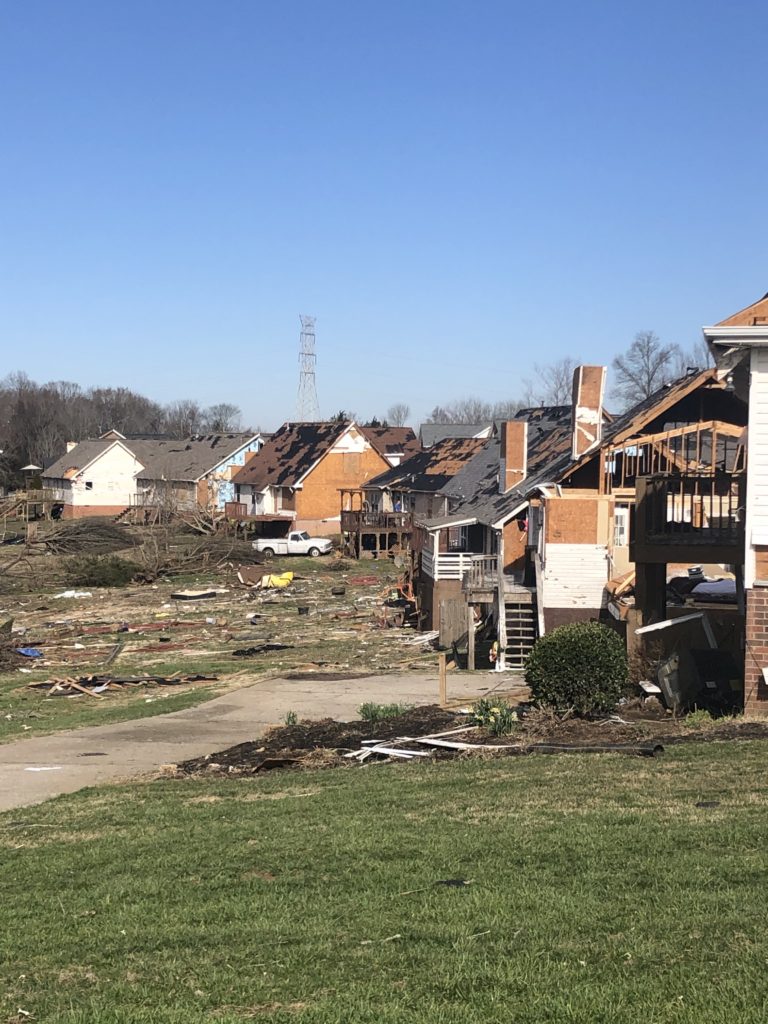
I just got back from helping those impacted by the tornadoes in Mt. Juliet. It’s hard to put into words what the Redemption City team and I saw. Houses ripped off of their foundations, sides of homes completely gone, people’s personal belongings found on the other side of their neighborhood, yards filled with everything you can imagine, just to name a few of the things that I remember seeing. People in various types of uniforms were walking around assessing the damage. Homeowners and those helping them were working hard, shedding tears, hugging, and staring at the wreckage.
I heard stories of families crying out to Jesus to save them as they braced for what they thought would be their end, stories of neighbors rescuing their neighbors who were buried underneath their homes, and even a story of a kid who miraculously lived to tell about how he was sucked out of a room where he was playing a video games.
Like many, we were there to help in any way that we could. And help we did. But not near as much as we wish we could. Over the coming days and weeks, many more of us will play a small part in the massive recovery effort. But right now, as you patiently wait and pursue opportunities, I think it’s important to keep in mind a three reasons that make the disaster relief process slower than many people expect that it would be.
The Process Is Slow Initially Because Significant Amounts Of Money Are On The Line – When we showed up to help clean up houses and yards, we had to stand around a good bit. Why? Because before something could be thrown away, it needed to be documented. Why? Because the insurance company needed proof that it existed in order for there to be any chance that they’d provide money for it. Even finding out the need for pictorial documentation was a process because the insurance company is hard to get a hold of when a ton of people are all calling it at once. Don’t be surprised when the process is slow, especially early on, because people are doing everything they can to make sure they are in the best position possible to win their coming battle with their insurance company.
The Process Is Slow Initially Because Personal Stuff Needs To Be Sorted Through By People Who Are Still In Shock – When you go into these homes you notice a lot of stuff that seems like it could easily be thrown away or straightened up. The reason you don’t do that is because there is a lot of personal stuff in the mess that the owners wouldn’t want anyone else to see. Of course, the only people who can work through that stuff are also the people who are still shaking from this week’s events. Be sure when you help that you remember that these folks need space to process their personal stuff.
The Process Is Slow Initially Because Many Major Tasks Have To Be Completed Before Related Minor Ones Can Be – Before certain homes can be helped, roads that lead to those homes need to be cleared. Before certain parts of a home can be cleared of valuables, the structure of that home needs to be secured again. Before the stuff all over people’s yards could be taken to the road, we needed the city to tell us which types of things to stack together for an easy pick up. Over and over, we came across tasks that we could easily have completed, if, and only if, something major (a task we couldn’t complete) was completed first. And, of course, the people who have the machinery and expertise to complete those major tasks aren’t usually going to be around for a day or two (or weeks) because there is so much to do. So when you help, remember that there are a lot of layers to a recovery effort of this scope that impact the major things that need to be done.
The process is slow initially and many people struggle to be patient. Learning these three realities today really helped me to be patiently engaged, as I continue to my best to pray, stay out of the way, serve, and give.